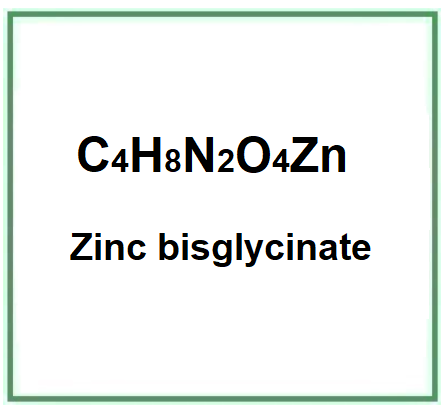Zinc bisglycinate is a chemical compound, also known as zinc diglycinate, which is a chelated form of zinc and the amino acid glycine.
The name defines the structure of the molecule:
- Zinc indicates the presence of zinc ions (Zn2+) in the compound.
- Bisglycinate. The prefix 'bis-' means 'twice' and 'glycinate' refers to the glycinate ion, which is the deprotonated form of glycine. So 'bisglycinate' means that there are two glycinate ions associated with each zinc ion.
The synthesis process takes place in different steps:
- Preparation of the glycine solution. Glycine, a simple amino acid, is dissolved in water to create a solution.
- Reaction with zinc. A zinc compound, such as zinc oxide or zinc carbonate, is added to the glycine solution. Zinc reacts with glycine to form zinc bisglycinate.
It appears in the form of a white powder.

What it is for and where
Zinc bisglycinate it's often used as a dietary supplement due to its high bioavailability and gentle effect on the stomach.
Medical
- Zinc Supplement. Zinc bisglycinate is used as a zinc supplement to prevent and treat zinc deficiency. Zinc is an essential mineral that plays a crucial role in numerous bodily functions, including immune function, protein synthesis, wound healing, DNA synthesis, and cell division.
- Immune Support. Zinc is known for its role in supporting the immune system. Adequate zinc intake is essential for the normal development and function of cells mediating innate immunity, neutrophils, and natural killer cells.
- Skin Health. Zinc plays a role in maintaining skin integrity and structure. People who have wounds or ulcers that are slow to heal may be given zinc supplements to aid in the healing process.
- Eye Health. Zinc is needed for maintaining the health of the retina, and it's often included in oral supplements for age-related macular degeneration.
- Mental Health. Zinc has been implicated in mental health, with some evidence suggesting it can help manage symptoms of depression and anxiety.
- Gastrointestinal Tolerance. Zinc bisglycinate is often chosen as a supplement because it is less likely to cause gastrointestinal side effects compared to other forms of zinc.
Cosmetics
Skin conditioning agent. It is the mainstay of topical skin treatment as it has the function of restoring, increasing or improving skin tolerance to external factors, including melanocyte tolerance. The most important function of the conditioning agent is to prevent skin dehydration, but the subject is rather complex and involves emollients and humectants that can be added in the formulation.
Chemical safety


- Molecular Formula C4H8N2O4Zn
- Molecular Weight 213.5 g/mol
- CAS 14281-83-5
- UNII 681VJX72FE
- EC Number 238-173-1
![]() Zinc bisglycinate
Zinc bisglycinate 




